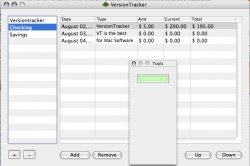Ok I'm having big issues with memory leakages in my app, I figured out how to change between different accounts on the left side, I uploaded my app in another thread, but here's the updated code that I have for on section.
I'm thinking my leak is with the mutable array being allocated with an array, but never being released. Is there a function where I can put an array in the array without allocating it again?
Code:
- (void)showTransactionsForAccount:(id)sender
{
NSLog(@"You chose %d", [accountView selectedRow]);
if([accountView selectedRow] >= 0)
{
NSMutableArray *transAcct = [[NSMutableArray alloc] initWithArray:[[accounts objectAtIndex:
[accountView selectedRow]]transactions]];
NSLog(@"%@", transAcct);
if(transAcct != nil) {
//[transactions release];
transactions = transAcct;
[self setTransactions:transactions];
[tableView setNeedsDisplay:YES];
}
}
}I'm thinking my leak is with the mutable array being allocated with an array, but never being released. Is there a function where I can put an array in the array without allocating it again?


